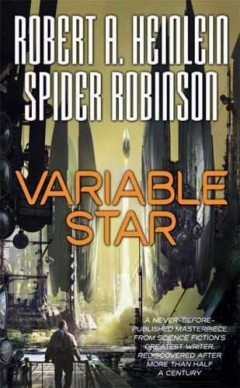
Melancholy Elephants, a Hugo Award winner from 1983, is the kind of story you get when a talented craftsmen, after some genuine contemplation on a topic, has come up with a unique perspective on an issue, discovered something worth thinking about. For the libertarian, it has the added attraction of advocating freedom of artistic expression, as well as a frank depiction of government corruption. Though Spider Robinson’s short work fizzles at the end, it’s engaging and thought-provoking and ultimately worth your time.
Despite the mildly disappointing ending, I cannot find fault with the beginning. Even the title is exactly what a title should be: odd enough to be intriguing while encapsulating what the story is about, but this becomes obvious only afterwards. It gives away nothing of the tale at the outset.
The short story format affords an author little time to grab his reader’s attention; Spider Robinson does it in the first paragraph. The main character, Dorothy Martin, has such a bizarre reaction to a situation she is subjected to that any impulse to put the story down evaporates, rather like what a startle does to the impulse to yawn.
[continue reading…]
Help Promote Prometheus Unbound by Sharing this Post
A few notable things I ran across recently:
- Will Thomas of The Atlas Society (formerly known as The Objectivist Center) argues that transhumanism is compatible with Objectivism.
- Kylie Sturgess, in her Curiouser and Curiouser column for the Committee for Skeptical Inquiry, interviewed Scott Sigler. I hadn’t heard of him before, but apparently he’s known as a podcaster and now also as an author of techno-thrillers.
Sigler describes skeptics as people
who were spreading the other side of the information instead of misinformation. They are out actively encouraging people to think for themselves, and what’s been interesting is that they’re not necessarily telling people “this is bunk.” They are encouraging people to think critically about things and learn how to address things when you run into them.
He goes on to mention how, among other things, evolution is being challenged in America. But there’s a flipside to long-accepted, fairly well-established science being attacked in knee-jerk fashion by those faith-based types leery of science in general and of science that challenges their religious beliefs in particular. Sometimes science can become corrupted in politically-charged fields, and scientists lose their objectivity. I’m reminded of an old post I wrote about scientific skepticism in relation to global warming alarmism. I riffed off of Clarke’s First Law of Prediction and Asimov’s Corollary.
But to get back to Scott Sigler, has anyone read any of his work? If so, what do you think? Do you recommend it?
[continue reading…]
Help Promote Prometheus Unbound by Sharing this Post

 [Warning: Some mild spoilers.]
[Warning: Some mild spoilers.]
If the making of a movie is a series of steps in a long path to the finished product, then the makers of Skyline trod boldly on the first flagstone, took a misstep on the next, stubbed their toes on the third and generally staggered off balance the rest of the way. The concept is as full of potential as one could want it to be: aliens invade, slaughter and eat the human race while a group of beautiful young people bunker down in an apartment building, fighting for their lives and arguing about what to do next. Great movies have been based on ideas no more complex than this, but the makers of those movies glided more gracefully along the rest of the production path.
Skyline, though not awful, is not a great movie, nor even a good one. It displays a respectable technical proficiency which any producer can purchase if his coffers are full. This and the aforementioned concept are its strongest points. It lacks artistry in all aspects where technical expertise cannot suffice, and suffers from that mild incoherence which results from underdeveloped and abandoned plot points.
[continue reading…]
Help Promote Prometheus Unbound by Sharing this Post

I just found out about this great website that has all of the episodes from every Star Trek tv series online for free. It’s probably not legal, so check it out while you can at WatchTrek!
Also, have a gander at this, I’m assuming photoshopped, image of a Jeffrey Tucker human action figure complete with plastic gold coins.

Help Promote Prometheus Unbound by Sharing this Post
Via Cory Doctorow at Boing Boing comes word of this funny piece of flash fiction, a science fiction story disguised as a review of a set of $6,800.00 audio cables, themselves a free market wealth redistribution mechanism in disguise, designed to seduce gullible audiophiles out of their money.
We live underground. We speak with our hands. We wear the earplugs all our lives.
PLEASE! You must listen! We cannot maintain the link for long… I will type as fast as I can.
DO NOT USE THE CABLES!
We were fools, fools to develop such a thing! Sound was never meant to be this clear, this pure, this… accurate. For a few short days, we marveled. Then the… whispers… began.
Were they Aramaic? Hyperborean? Some even more ancient tongue, first spoken by elder races under the red light of dying suns far from here? We do not know, but somehow, slowly… we began to UNDERSTAND.
[continue reading…]
Help Promote Prometheus Unbound by Sharing this Post


[Warning: Contains some spoilers, mainly in the 6th and 7th paragraphs.]
Every so often a book comes along that truly makes you appreciate writing as a subject; one that truly captures the imagery that we see and feel in our lives when we so often lack the time for reflection.
Wĭthûr Wē is such a book. Yet, such a recommendation doesn’t quite do it justice because its beautiful imagery is only a backdrop for a rich libertarian narrative and struggle of ideas.
Wĭthûr Wē is set several centuries in the future. We never learn the exact year but late in the book we discover that it must be the 28th century. Humans have colonized a small portion of the galaxy — perhaps a thousand light years across — but have yet to discover any alien civilizations. Only the three million year old Ruins on the planet Kaldis provide any proof that non-human intelligence exists, or at least existed once, in the universe.
Alistair Ashley 3nn, the main character of the tale and mouthpiece of Rothbardian philosophy, has just returned from his tour of duty on Kaldis, a human colony at war over their form of government. His experiences have obviously marked him, because those who knew him before he left remark on how different he now is, both physically and emotionally. Alistair has prepared well for his return to Aldra, his home planet, and its tightly regulated — and therefore wÄthà»ring — economy. Through a clever, and very sci-fi, technique, he smuggles instructions for making black market medicine and sells them to black market merchants. He demands gold, not the easily inflatable Aldran Credit which is nothing more than a bit of electronic information stored on a magnetic strip.
Alistair, who has disavowed the 3nn which the government tacked onto his name, was taught the principles of libertarianism by his grandfather who died while he was “off” on Kaldis. He returns angry at the atrocities he has seen and his anger only grows when he sees how much further towards serfdom his home planet has travelled in the four cycles (years) since he has been off. When his father’s home is stolen by the government in an Aldran version of eminent domain, he uses the money from his medicine sale to begin his own private rebellion. He begins by burgling the house of the politician who stole his father’s home, bitterly noting as he leaves that most people would consider Alistair the thief, and not the politician.
[continue reading…]
Help Promote Prometheus Unbound by Sharing this Post

Gizmodo has an interesting post about How Ma Bell Shelved the Future for 60 Years. It is an excerpt from The Master Switch by Tim Wu.

Here is the money quote:
This is the essential weakness of a centralized approach to innovation: the notion that it can be a planned and systematic process, best directed by a kind of central intelligence; that it is simply of matter of assembling all the best minds and putting them to work in unison. Were it so, the future could be planned and executed in a scientific manner.
Yes, Bell Labs was great. But AT&T, as an innovator, bore a serious genetic flaw: it could not originate technologies that might, by the remotest possibility, threaten the Bell system. In the language of innovation theory, the output of the Bell Labs was practically restricted to sustaining inventions; disruptive technologies, those that might even cast a shadow of uncertainty over the business model, were simply out of the question.
~*~
Cross-posted at The Libertarian Standard.
Help Promote Prometheus Unbound by Sharing this Post

















